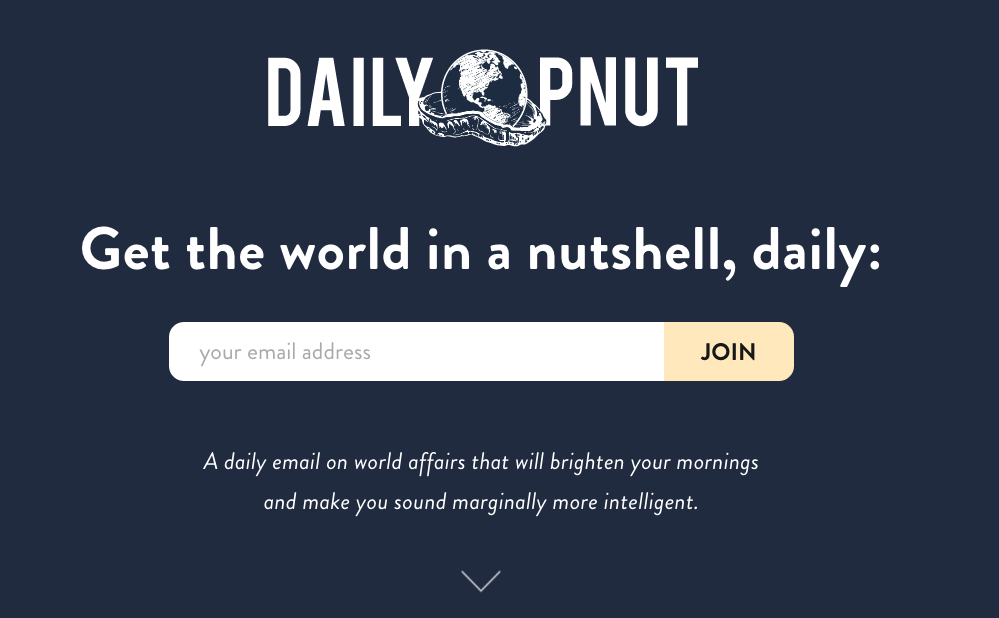Harvard-Spun Daily Pnut Is Taking On theSkimm in Satirical News
 Tewfik Cassis, Alex Schuster, and Fred Spring want to make you laugh every morning. But they plan to elicit that grin using global news.
Tewfik Cassis, Alex Schuster, and Fred Spring want to make you laugh every morning. But they plan to elicit that grin using global news.
Their medium is Daily Pnut, a daily email covering world affairs that’s designed to make you sound “marginally more intelligent.” Among their early readers? Renowned linguist Noam Chomsky and popular cognitive scientist Steven Pinker.
The trio met pursuing graduate degrees at Harvard University, each coming from a different background. Cassis was a founding associate of venture capital firm Romulus Capital, Spring served as a former policy advisor to the Cabinet Office of the United Kingdom, and Schuster worked as an associate producer for HuffPost Live. What they all shared, however, was a passion for world news.
They launched a site called OpedSpace in late 2014, to provide young professionals with a platform where they could share their opinions on world events.
“We thought there was a clear need to help people understand what’s going on,” Cassis says. “But the voice we were writing with was too serious and contributors thought it was a cumbersome experience. They wanted something digestible.”
The founders folded OpedSpace in July 2015 and shifted their focus to creating a resource similar to theSkimm, a daily email newsletter that’s raised nearly $8 million (and Oprah’s attention) with its snarky approach to covering news.
“We love what theSkimm is doing, and we think they’re doing a good job, but we wanted to delve deeper into global topics,” Cassis says, noting the tens of thousands of readers the Daily Pnut has across 40 different countries.
It was theSkimm’s witty, satirical tone, however, that they wanted to carry over, as well as a brevity the founders deem critical to their distribution model.
“People want something, and they want it quickly and they want it funny,” Cassis explains, using the “John Oliver Effect” as an example.
The Daily Pnut sends subscribers its newsletter Monday through Friday, and publishes “nutshells,” or summaries that dive deeper into topics such as “What You Need to Know About the Iran Deal” or “What’s Going On With China’s Economy?” The goal is to deliver bite-sized content to those who want it, but provide others the ability to double click on the topics they care about most.
Spring knew the company was onto something when a stranger sitting next to him at dinner repeated a joke featured in the Daily Pnut. “We are passionate about global issues,” Spring says, “but we want to translate those issues into a language for someone who doesn’t understand them to understand.”
As the company continues to grow, they plan to develop more region-specific content, and invest in different content delivery tools, including podcast and video.
“There is a global vision of what we want to do,” Cassis says. “We want to start doubling down on the type of content we deliver. We see the newsletter as a wedge for a broader media company we want to build.”
They are prepared to reposition the company over time, depending on the feedback they receive from readers. In five years, Cassis acknowledges he wouldn’t be surprised if the distribution model has changed. “If people want to receive stuff via Facebook Messenger, we’ll do that.”
And a group of angel investors have helped prove the Daily Pnut is off to a strong start. The startup has received $300,000 in seed financing, and produced an email open average of more than 40 percent.
“The whole purpose of this is to build the next form of newspaper,” Cassis says. “And we’re trying to do that for a generation that doesn’t want to have to dig around their social media.”


